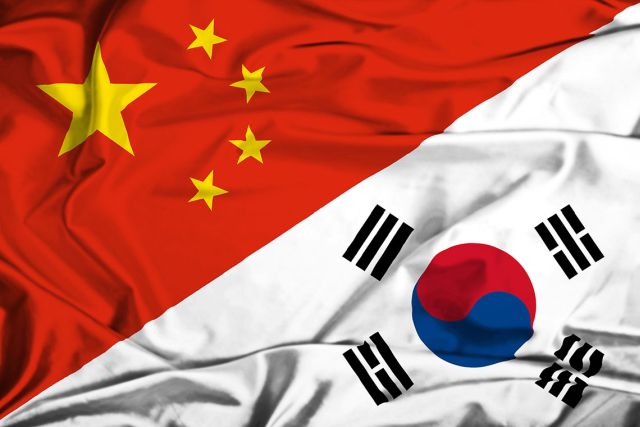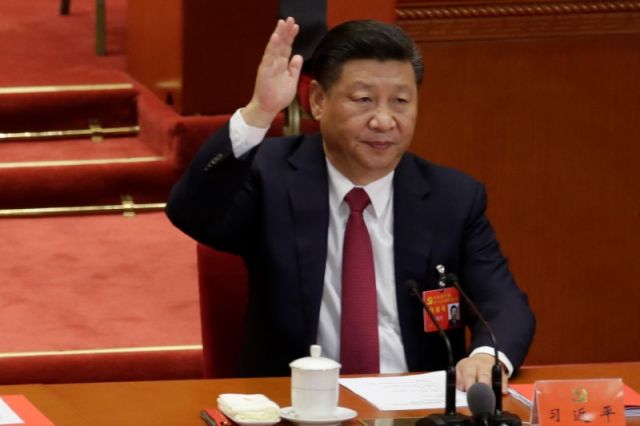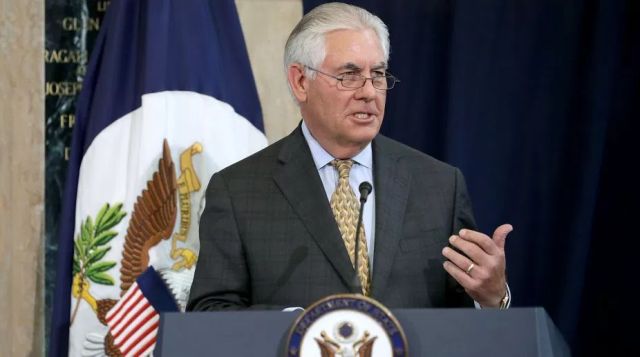
by Editor | May 25, 2021 | World
 Seoul : South Korea and China on Tuesday said they wanted to normalise and improve bilateral ties despite disagreement over a controversial US anti-missile system installed in Seoul which is criticised by Beijing.
Seoul : South Korea and China on Tuesday said they wanted to normalise and improve bilateral ties despite disagreement over a controversial US anti-missile system installed in Seoul which is criticised by Beijing.
“The two sides have emphasised the great importance of South Korea-China link and have decided to promote further development of their strategic relationship and cooperation,” a joint statement released by the Seoul Foreign Ministry said.
It also highlighted that both countries share the vision that strengthening exchanges and cooperation serves common interests and the countries have thus agreed to reorient them quickly to their normal course in all areas, reports Efe news.
This is the greatest gesture of rapprochement between the two countries since China, Seoul’s main trading partner, started a covert boycott of South Korean interests in retaliation for the installation of the Terminal High Altitude Area Defence (THAAD) missile system.
The boycott has hit South Korean companies, some of which were even forced to stop operating in China, and has adversely affected diplomatic ties despite the strong rapprochement shown by the two countries in the last five years.
The joint statement is the result of a meeting between the South Korean National Security Council vice chief Nam Gwan-pyo and Chinese Assistant Foreign Minister Kong Xuan You.
As a token of this rapprochement the presidents of both countries, Moon Jae-in and Xi Jinping, will hold a bilateral meeting on the sidelines of the Asia-Pacific Economic Cooperation forum to be held from November 12 to 14 in Vietnam.
However, both countries have reiterated and defended their respective positions in relation to the controversial THAAD, the joint statement said.
Seoul and Washington argue that the shield only aims to protect against North Korean missiles but according to Beijing the THAAD radars can be used to spy on its military bases and has insisted on its withdrawal.
—IANS

by Editor | May 25, 2021 | Business, Corporate, Corporate finance, Economy, Large Enterprise, News, Politics
 By Gaurav Sharma,
By Gaurav Sharma,
Beijing : China on Thursday said India will gain more if it joins the Belt and Road initiative at an early date.
Inviting India to be a part of China’s ambitious multi-trillion dollar project, the Foreign Ministry said New Delhi will get tangible benefits if it joins the initiative.
“We welcome other countries including India to participate in the Belt and Road initiative. The Belt and Road will bring tangible benefits to you if participated in at an early date,” Chinese Foreign Ministry spokesperson Geng Shuang said.
He was responding to reported remarks by a Chinese official that Beijing will try to address New Delhi’s concern over the Belt and Road project whose key artery goes through the disputed Kashmir.
Geng said he was not aware of any such statement.
India greatly opposes the project because the China-Pakistan Economic Corridor cuts through a part of Kashmir held by Islamabad and claimed by New Delhi.
However, China maintains that the project will not affect its neutrality over the Kashmir issue.
“As far as India is concerned, the goal of this initiative is to promote the connectivity between counties and promote common prosperity of all countries and the initiative will not affect China’s position on the relevant issue,” Geng said.
—IANS

by Editor | May 25, 2021 | World

Xi Jinping
Beijing : Communist Party of China (CPC) Central Committee General Secretary Xi Jinping on Wednesday said that the coming five years will witness several important “junctures and signposts”.
“As I look ahead to the next five years, I see several important junctures and signposts,” Xi made the remarks while leading other members of the Standing Committee of the 19th CPC Central Committee Political Bureau to meet the press, Xinhua reported.
He stated that the coming five years between the 19th and the 20th Party Congress is the period in which timeframes of the Two Centenary Goals will converge,
“Not only must we deliver the first centenary goal, we must also embark on the journey toward the second centenary goal, said Xi.
“With decades of hard work, socialism with Chinese characteristics has entered a new era. In this new context, we must get a new look and more importantly make new accomplishments.”
—IANS

by Editor | May 25, 2021 | World

Chinese President Xi Jinping
By Gaurav Sharma,
Beijing : Chinese President Xi Jinping has emerged on par with former leaders Mao Zedong and Deng Xiaoping with his political ideology being added into the constitution of the Communist Party of China (CPC).
The symbolic move came on the final day of a week-long political summit in Beijing, the 19th CPC National Congress, at which Xi, 64, pledged to lead the world’s second largest economy into a “new era” of international power and influence.
With the inclusion of “Thought on Socialism with Chinese Characteristics for a New Era”, Xi has surpassed veterans like Jiang Zemin and Hu Jintao.
Xi is the third Chinese leader after Mao and Deng whose theory will be added to the constitution of the world’s largest political party.
“The Congress unanimously agrees on Xi Jinping’s ‘Thought on Socialism with Chinese Characteristics for a New Era’ in addition to Marxism-Leninism, Mao Zedong, Deng Theory,” the amendment to the constitution read.
“The Congress urges all Party members to use the Thought to achieve unity in thinking and action, be more purposeful and determined in studying and applying it.”
“Our party shows strong, firm and vibrant leadership,” Xi said in a brief address to more than 2,200 delegates.
“Our socialist system demonstrates great strength and vitality. The Chinese people and the Chinese nation embrace brilliant prospects.
“Today we more than 1.3 billion China’s people live in jubilation and dignity. Our land radiates with enormous dynamism. Our Chinese civilisation shines with lasting splendour and glamour,” the Guardian quoted Xi as saying.
Since the People’s Republic of China was founded in 1949, only Chairman Mao had been honoured in such a way while still alive, in his case with a political philosophy called Mao Zedong Thought.
Chairman Mao founded the People’s Republic of China in 1949.
Also on Tuesday, the CPC unveiled a new leadership, electing the 19th Central Committee to lead the party for the next five years.
The 19th CPC Central Committee will in turn elect the Political Bureau, the Standing Committee of the Political Bureau and the General Secretary at its first plenary session on Wednesday, reports Xinhua news agency.
According to the Party Constitution, the highest leading body of the CPC is the National Congress and the Central Committee it elects, and all constituent organisations and members of the Party are subordinate to the National Congress and the Central Committee.
The number of delegates to the National Congress and the procedure governing their election shall be determined by the Central Committee.
—IANS

by Editor | May 25, 2021 | Muslim World, News, Politics, World

Rex Tillerson
By Aroonim Bhuyan,
New Delhi : Prior to his maiden visit to India in his official capacity, US Secretary of State Rex Tillerson has made clear Washington’s position on key geopolitical and strategic matters pertaining to the Indo-Pacific and South Asian regions, saying the “Trump administration is determined to dramatically deepen ways for the United States and India” to further their strategic partnership that is heading for “strategic convergence” and put China and Pakistan on notice that it intended to “do what is needed” to support India.
“In this period of uncertainty and somewhat angst, India needs a reliable partner on the world stage. I want to make clear: with our shared values and vision for global stability, peace, and prosperity, the United States is that partner,” Tillerson said categorically while making a major policy statement at the Centre for Strategic and International Studies (CSIS) in Washington DC on Wednesday.
While asserting that China’s “provocative actions” went against the international law and norms that the US and India stood for, Tillerson made it clear that Washington expected Pakistan to take “decisive action” against terrorist groups operating within its territory.
“China, while rising alongside India, has done so less responsibly, at times undermining the international, rules-based order even as countries like India operate within a framework that protects other nations’ sovereignty,” the Secretary of State, who will be visiting New Delhi next week, said while delivering an address on ‘Defining Our Relationship with India for the Next Century’.
The statement assumes significance in the wake of the 73-day standoff between Indian and Chinese troops in the Doklam region of Bhutan. New Delhi and Beijing eventually withdrew their troops from the region on August 28 just days ahead of Prime Minister Narendra Modi’s visit to China for the annual BRICS (Brazil, Russia, India, China, South Africa) Summit.
In his remarks, Tillerson also referred to China’s aggressive stance in the South China Sea region and said the US and India would work together for the security architecture in the Indo-Pacific region.
“China’s provocative actions in the South China Sea directly challenge the international law and norms that the United States and India both stand for,” he said.
“The United States seeks constructive relations with China, but we will not shrink from China’s challenges to the rules-based order and where China subverts the sovereignty of neighbouring countries and disadvantages the US and our friends.”
Tillerson said that India and the US “should be in the business of equipping other countries to defend their sovereignty, build greater connectivity, and have a louder voice in a regional architecture that promotes their interests and develops their economies”.
“This is a natural complement to India’s Act East policy,” he stated.
In this context, he also said that the US, India and Japan were “already capturing the benefits of our important trilateral engagement” and said “India and the United States must foster greater prosperity and security with the aim of a free and open Indo-Pacific. The Indo-Pacific – including the entire Indian Ocean, the Western Pacific, and the nations that surround them – will be the most consequential part of the globe in the 21st century.”
These words will come as music to New Delhi’s ears ahead of Modi’s visit to the Philippines next month for the Association of Southeast Asian Nations (Asean) and East Asia Summits.
Tillerson’s remarks also came amid Chinese President Xi Jinping’s assertion at this week’s National Congress of the Communist Party of China that Beijing would never give up its “legitimate rights and interests”.
Despite US President Donald Trump’s new South Asia Strategy that sees Pakistan as an important partner, Tillerson made no bones about the fact that Washington expected Islamabad to take strong action against terror.
“We expect Pakistan to take decisive action against terrorist groups based within their own borders that threaten their own people and the broader region,” he said.
“In doing so, Pakistan furthers stability and peace for itself and its neighbours, and improves its own international standing.”
Tillerson also referred to the US’ designation of the Hizbul Mujahideen as a foreign terrorist organisation and said this was “because the United States and India stand shoulder-to-shoulder against terrorism”.
“States that use terror as an instrument of policy will only see their international reputation and standing diminish,” he said, leaving to no one’s imagination which country he was referring to.
(Aroonim Bhuyan can be contacted at aroonim.b@ians.in)
—IANS

 Seoul : South Korea and China on Tuesday said they wanted to normalise and improve bilateral ties despite disagreement over a controversial US anti-missile system installed in Seoul which is criticised by Beijing.
Seoul : South Korea and China on Tuesday said they wanted to normalise and improve bilateral ties despite disagreement over a controversial US anti-missile system installed in Seoul which is criticised by Beijing.



